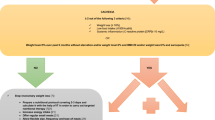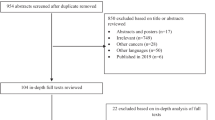Abstract
Goals
Anorexia is the second most common symptom after fatigue in patients with advanced cancer. We quantified the relationship between anorexia and patient satisfaction with quality of life (QoL) in advanced cancer.
Materials and methods
A case series of 954 cancer patients treated at the Cancer Treatment Centers of America. Anorexia was measured using the QLQ-C30 loss of appetite/anorexia subscale. Patient satisfaction with QoL was measured using the Ferrans and Powers Quality of Life Index (QLI). The relationship between anorexia and QLI was evaluated using multivariate analysis of variance and multiple regression analysis.
Main results
Of 954 patients, 579 were females and 375 males with the median age at presentation of 56 years. Of these patients, 66% had failed prior treatment. Most common cancers were breast (26%), colorectal (19%), and lung (16%). After controlling for the effects of age, treatment history, and other QLQ-C30 symptom subscales, every 10 unit increase in anorexia was statistically significantly associated with 0.18 unit decline in QLI health and physical function score.
Conclusion
We found that anorexia is significantly correlated with patient satisfaction with health and physical function in advanced cancer. Future studies should evaluate the impact of integrative cancer care services on patient satisfaction with QoL.
Similar content being viewed by others
References
Aaronson NK, Ahmedzai S, Bergman B et al (1993) The European Organization for Research and Treatment of Cancer QLQ-C30: a quality-of-life instrument for use in international clinical trials in oncology. J Natl Cancer Inst 85(5):365–376
Cella DF, Bonomi AE (1995) Measuring quality of life: 1995 update. Oncology (Williston Park) 9(11 Suppl):47–60
Chang VT, Xia Q, Kasimis B (2005) The Functional Assessment of Anorexia/Cachexia Therapy (FAACT) appetite scale in veteran cancer patients. J Support Oncol 3(5):377–382
Davis MP, Dickerson D (2000) Cachexia and anorexia: cancer’s covert killer. Support Care Cancer 8(3):180–187
Ferrans CE (1990) Development of a quality of life index for patients with cancer. Oncol Nurs Forum 17(3 Suppl):15–19
Ferrans CE (1996) Development of a conceptual model of quality of life. Sch Inq Nurs Pract 10(3):293–304
Ferrans CE, Powers MJ (1985) Quality of life index: development and psychometric properties. ANS Adv Nurs Sci 8(1):15–24
Ferrans CE, Powers MJ (1992) Psychometric assessment of the quality of life index. Res Nurs Health 15(1):29–38
Groenvold M, Klee MC, Sprangers MA, Aaronson NK (1997) Validation of the EORTC QLQ-C30 quality of life questionnaire through combined qualitative and quantitative assessment of patient–observer agreement. J Clin Epidemiol 50(4):441–450
Hjermstad MJ, Fossa SD, Bjordal K, Kaasa S (1995) Test/retest study of the European organization for research and treatment of cancer core quality-of-life questionnaire. J Clin Oncol 13(5):1249–1254
Jacobsen PB, Weitzner MA (1999) Evaluation of palliative endpoints in oncology clinical trials. Cancer Control 6(5):471–477
Lagman RL, Davis MP, LeGrand SB, Walsh D (2005) Common symptoms in advanced cancer. Surg Clin North Am 85(2):237–255
Laviano A, Meguid MM, Inui A et al (2005) Therapy insight: cancer anorexia–cachexia syndrome—when all you can eat is yourself. Nat Clin Pract Oncol 2(3):158–165
Laviano A, Meguid MM, Rossi-Fanelli F (2003) Cancer anorexia: clinical implications, pathogenesis, and therapeutic strategies. Lancet Oncol 4(11):686–694
Maltoni M, Nanni O, Pirovano M et al (1999) Successful validation of the palliative prognostic score in terminally ill cancer patients. Italian Multicenter Study Group on Palliative Care. J Pain Symptom Manage 17(4):240–247
McClement S (2005) Cancer anorexia–cachexia syndrome: psychological effect on the patient and family. J Wound Ostomy Continence Nurs 32(4):264–268
Osoba D (1994) Lessons learned from measuring health-related quality of life in oncology. J Clin Oncol 12(3):608–616
Osoba D, Rodrigues G, Myles J et al (1998) Interpreting the significance of changes in health-related quality-of-life scores. J Clin Oncol 16(1):139–144
Pirovano M, Maltoni M, Nanni O et al (1999) A new palliative prognostic score: a first step for the staging of terminally ill cancer patients. Italian Multicenter and Study Group on Palliative Care. J Pain Symptom Manage 17(4):231–239
Walsh D, Rybicki L (2006) Symptom clustering in advanced cancer. Support Care Cancer 14(8):831–836
Wilcock A (2006) Anorexia: a taste of things to come? Palliat Med 20(1):43–45
Acknowledgments
This study was funded by the Cancer Treatment Centers of America®. We thank Thom Wodek, Tanya Jordan, and Jody Wehrwein, our clinical research coordinators, for their contributions in the administration of the quality of life questionnaires to our patients and subsequent data entry.
Author information
Authors and Affiliations
Corresponding author
Rights and permissions
About this article
Cite this article
Lis, C.G., Gupta, D. & Grutsch, J.F. Can anorexia predict patient satisfaction with quality of life in advanced cancer?. Support Care Cancer 17, 129–135 (2009). https://doi.org/10.1007/s00520-008-0447-8
Received:
Accepted:
Published:
Issue Date:
DOI: https://doi.org/10.1007/s00520-008-0447-8




